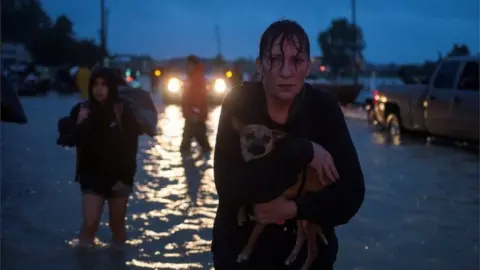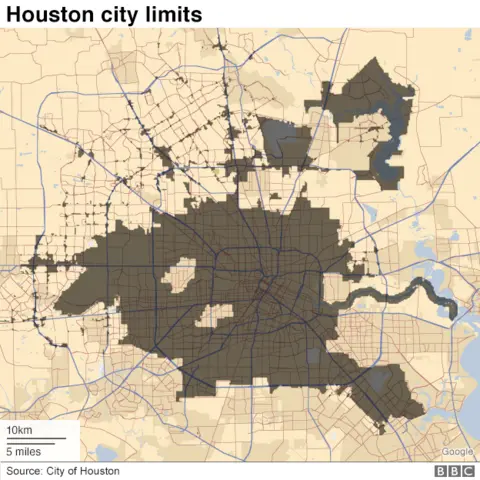Why was Houston not evacuated before Hurricane Harvey?
 Reuters
ReutersMore than 30,000 people have fled their homes as catastrophic flooding from Hurricane Harvey continues to soak Houston, Texas.
The nation's fourth largest city has endured five days of rain as the tropical storm barrels toward Louisiana, where residents are bracing for the same type of flooding that beset the state in 2005.
Hurricane Katrina made landfall 12 years ago on Tuesday, leaving nearly 2,000 people dead in its wake.
But for Houston, Harvey recalls the city's response to Hurricane Rita, which hit the state just three weeks after Katrina and led to a disastrous evacuation.
What happened with Hurricane Rita?
Houston has faced sharp criticism for telling its 2.3 million residents to stay put amid the unprecedented flooding, but local officials point to the lessons learned from the melee that ensued in September 2005.
With New Orleans still reeling from Katrina's devastation, the city issued an evacuation that prompted millions of Texans to flee their homes and led to 20-hour traffic jams, stranding drivers across hundreds of miles.
Of the more than 100 people who died during Hurricane Rita, at least 60 of those deaths were in connection to the evacuation, according to a 2006 report to the Texas House of Representatives.
Ten people died from heat exposure while 23 nursing home residents were killed in a bus fire.
City officials faced sharp criticism for creating chaos in the hours before the onset of Rita, whose impact was much smaller than originally anticipated.
Though Rita's 15-ft (4.5m) storm surge and 120mph (193km/h) winds levelled homes and knocked out power lines, critics said more people died than needed to in the lead-up to the storm.
After Rita, lawmakers directed the state's emergency management division to work with local communities to craft better hurricane response plans, including ways to restore power sooner to encourage residents to stay at home if their communities were not at risk from damage, according to the Texas Tribune.
State and local officials also began running drills to reverse traffic flow on highways in case of mass evacuations.
Why did they not evacuate before Harvey?
Harvey was the most powerful hurricane to hit Texas in more than 50 years when it made landfall on Friday near Corpus Christi, 220 miles (354km) south-west of Houston.
Houston Mayor Sylvester Turner has defended his decision to advise residents to stay at home, arguing that having people on flooded roadways could lead to more deaths.
Marshall Shepherd, a programme director in atmospheric sciences at the University of Georgia, pointed out that inside a car is one of the most dangerous places to be during flooding.
Allow X content?
The layout of the city, which sits just 50 ft above sea level, poses a threat to those attempting to flee amid the flooding.
Harvey has affected most of the greater Houston area, a sprawling population of 6.5 million people, which is prone to flooding due to its flat terrain.
 City of Houston
City of HoustonThe city's layout resembles a wagon wheel, bisected by a series of highways that flood with rainwater once its channels, creeks and bayous overflow.
"You would have had a calamity of biblical proportions; that's not an overstatement," said Texas State Representative Armando.
"If you put one million cars on the road when every major road in this region is under water, it would have been a disaster. There are challenges in any disaster, but that decision not to call for mandatory evacuations was the right decision," he told the Washington Post on Monday.
Residents in Harris County, of which Houston is the county seat, have also received mixed messages from local and state officials.
Texas Governor Greg Abbott encouraged residents to flee low-lying and coastal areas, even if mandatory evacuation had not been ordered, contradicting Mr Turner's order to stay put and find shelter.
Following Mr Abbott's warning, Francisco Sanchez, a spokesman for the Harris County Office of Homeland Security and Emergency Management, tweeted that residents should listen to local officials and ignore the governor's call.
What are officials saying now?
On Tuesday, officials warned residents of six northern Houston neighbourhoods to evacuate after two reservoirs, built to handle drainage water, began overflowing.
Residents in low-lying areas were also advised to evacuate after a levee along the Brazos River south of Houston breached due to Harvey's rains.
More than 3,500 people have been rescued by the authorities, Mr Turner said on Tuesday.
Many have been spending the night at a huge shelter in central Houston while Mr Turner has requested supplies for 10,000 storm victims from the Federal Emergency Management Agency (Fema), he said.
"This is a storm of historic proportions. Not just to the city of Houston and not just to Harris County but to the entire region," Mayor Turner said.
The city had initially planned to provide shelter for 5,000 residents and later increased it to 9,000 people.
What criticism has there been?
Retired Lieutenant General Russel Honore, the former commander of the Hurricane Katrina Joint Task Force, said local officials were underprepared. He urged authorities to "scale up" the amount of emergency responders available in Texas.
"If you tell six million people to stay in place then you need to have the first responders team pre-positioned," he told Fox News on Monday.
General Honore said the storm was "overmatched" with what Fema was prepared for, much like Katrina.
"You've got to have the capacity to go rescue them and they don't have that capacity," he added.
Critics have also blamed relaxed building regulations exacerbating the flooding.
A Pro Publica report in 2016 found that the city's rapid population growth had allowed some developers to build on top of acres of prairie land that once absorbed rainwater now overwhelming the city's bayous, drainage systems and reservoirs.
Harris County officials have rejected that claim.
